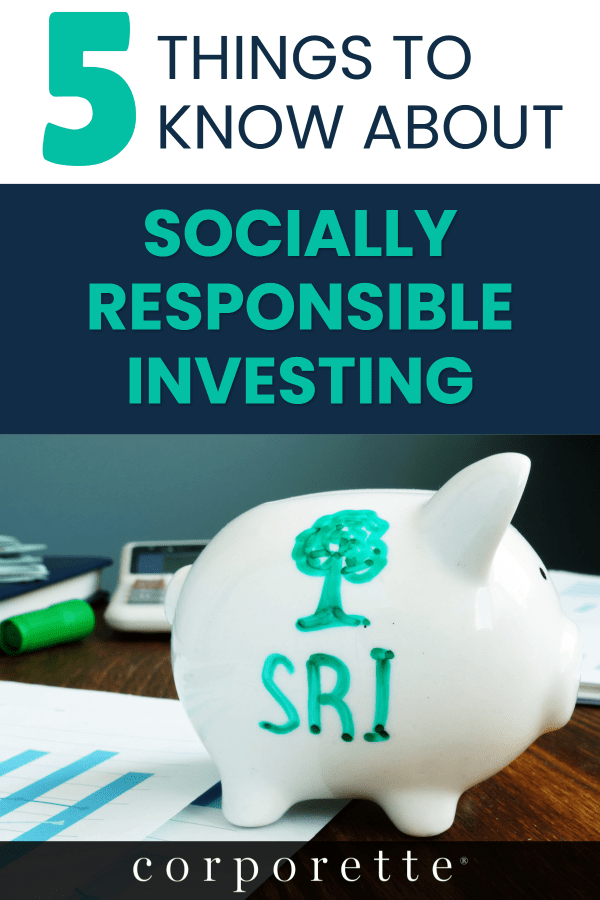This post may contain affiliate links and Corporette® may earn commissions for purchases made through links in this post. As an Amazon Associate, I earn from qualifying purchases.

We’ve talked a lot about investing over the years, from retirement accounts to asset allocation, but we’ve never specifically looked at socially responsible investing tips. Whether you call it ESG investing (ESG = environmental, social & governance), socially responsible investing, sustainable investing, ethical investing, or impact investing, it’s easier than ever to opt in — so we thought we’d discuss. (According to The New York Times, Even Harry and Meghan are getting into the game — at the top, obvs.)
First, here’s a quick definition of ESG investing from NerdWallet:
ESG investing is a form of sustainable investing that considers environmental, social and governance factors to judge an investment’s financial returns and its overall impact. An investment’s ESG score measures the sustainability of an investment in those specific categories.
In 2021, you can typically choose ESG funds when you’re making decisions about your IRA or brokerage accounts, but they’re still not a common option for 401(k)s. That may soon change, though. As CNBC recently reported, the Labor Department has proposed a new rule that would make it easier for employers to offer ESG investment choices for 401(k)s and 403(b)s.
Unfortunately, but not surprisingly, there’s a big reality check for socially responsible investing as a whole. It would be wonderful if it offered a simple, straightforward way to make a difference with your money and support the issues that mean the most to you, but with issues regarding greenwashing and “woke-washing,” it’s far from perfect. (And after all, as we all know, investment firms aren’t exactly shining paragons of ethical practices).
While it may be naive or simplistic, my personal perspective is that I’d rather at least TRY to do something good in an imperfect system. (Specifically, the IRA portfolios for my husband and I include the iShares ESG Aware MSCI EAFE ETF, iShares MSCI USA ESG Select ETF (both BlackRock), and so on.) Let’s hope that as individual investors demand more transparency and higher standards for investment firms, things will improve.
(To learn more about the pros and cons of ESG investing than we can address here, check out our Further Reading links at the bottom of this post.)
Before we get into specific platforms for socially responsible investing, we’ll share some helpful advice from an expert. Kacie Swartz, CFP, CIMA, who is a senior wealth manager at Stone Wealth Management in Austin, TX, explained the basics:
Corporette: Are the terms ESG investing, socially responsible investing, sustainable investing, and ethical investing basically the same thing? What is the most accurate or common term?
Kacie Swartz: These terms TECHNICALLY all have specific meetings but are used interchangeably by most industry experts and definitely in the media. For clients researching their options, ESG is the easiest keyword to search.
For someone who’s interested in ESG investing but doesn’t know where to start, do you recommend tools like Betterment that offer specific portfolios like this?
Absolutely! For true beginners, the Betterment funds are a great choice. They also have good articles on their site that provide an accessible starting point. For more research, I recommend the MSCI website.
Is it advisable to choose a certain societal issue to focus on, such as climate?
YES. This is a great point, as the “ESG” universe is very broad. Focusing on a particular issue (or a few) makes it a lot easier to narrow investment choices.
Are there any misconceptions about socially responsible investing that you can address?
A common misconception is that these funds don’t perform as well as “standard” portfolios, yet that is not backed by research. Even accounting for the massive inflows over the past few years, ESG funds have a strong track record of outperformance.
A second misconception is that ESG investing is a trend. It’s not. It’s a lens through which companies are being measured. The same issues that give a company a poor ESG score are issues that are not profitable for that company. (Think about how expensive it is to clean up an oil spill or fight a legal battle over poor hiring practices.) By filtering all investments through ESG metrics, you are finding companies that have more likelihood to be profitable.
Do you have any other tips to share?
In a highly profit-oriented world, we can impact change with our wallet. ESG investing shouldn’t be considered a corner of the market; it’s just investing in a way that doesn’t compromise the values you hold in all other parts of your life.
Socially Responsible Investing Platforms (Plus Some Usual Suspects)
Betterment’s Socially Responsible Investing
Betterment’s Socially Responsible Investing helps you focus on climate impact (supporting companies with lower carbon emissions and the funding of green projects; divesting from holders of fossil-fuel reserves) or social impact (supporting companies working toward minority empowerment and gender diversity). You can also invest in ETFs that consider all ESG elements (e.g., greater board diversity).
Ellevest’s Impact Investing
Ellevest’s Impact Portfolios are up to 53% invested in ESG and impact funds. You can focus on women in leadership (companies with more women leaders and policies that advance women), community development (funds supporting loans for affordable housing and community services), or sustainable practices (companies with higher standards for sustainability and ethical practices).
OpenInvest’s Values-Based Investing
With the Values-Based Investing from OpenInvest (acquired by JP Morgan in 2021), you have a ton of very focused options: reducing greenhouse gas emissions; divesting from fossil fuel producers, weapons, and/or the prison industrial complex; investing in women leaders, racial justice, and/or disability inclusion; supporting LGBTQIA+ rights, refugees, and/or animal welfare; fighting deforestation; and much more.
{related: 7 brands that offer eco-friendly clothes to wear to work}
EarthFolio ESG Portfolios
EarthFolio (from Blue Marble Investments) notes that it “invests exclusively in sustainable funds that screen on up to 10 separate environmental, social and corporate governance (ESG) criteria.” The criteria are conservation, clean tech, equality & diversity, human rights, fair labor, animal welfare, non-violence, corporate governance, healthy living, community development, fossil-fuel free, and shareholder advocacy.
Merrill Lynch’s Guided Investing
Merrill Guided Investing offers socially responsible portfolios for sustainable and impact investing. They use an A-B-C framework: Avoid (reduce negative social or environmental effects; manage risk by limiting certain exposures), Benefit (support positive social or environmental practices, enhance potential for long-term competitive financial returns), and Contribute (advance positive, measurable social or environmental outcomes; target opportunities where impact is intrinsic to financial performance).
{related: do you boycott companies because of your personal beliefs?}
Vanguard’s ESG Investing
Vanguard offers easy options for ESG investing, and their ESG investing page details their lineup of mutual funds and ETFs. You can choose to exclude certain companies (e.g., those that produce nuclear power; do not meet diversity criteria; or produce civilian, controversial, and conventional weapons) and/or intentionally invest in sectors/companies with “higher ESG ratings than their industry peers or other investment opportunities.”
{related: small political actions to take each week — no matter what party you’re in}
Readers, do tell: Do you seek out socially responsible investments? Do you focus on certain ESG issues in your investing? What are your best socially responsible investment tips, or advice on ESG investing?
Further Reading:
- What is ESG Investing & What Are ESG Stocks? [The Motley Fool]
- Here Is Everything You Need To Know About ESG: A Socially Responsible Way of Investing [NextAdvisor]
- 10 Best ETFs for Easy ESG Investing [Yahoo]
- The Biden administration is making it easier to invest in sustainable funds in your 401(k) [CNBC]
- Should your 401(k) follow your conscience? What to know before investing in ESG. [MarketWatch]
- Here’s How to Use Your Investments to Support Women [Real Simple]
- The thorny truth about socially responsible investing [Vox]
Stock photo via Deposit Photos / designer491.


